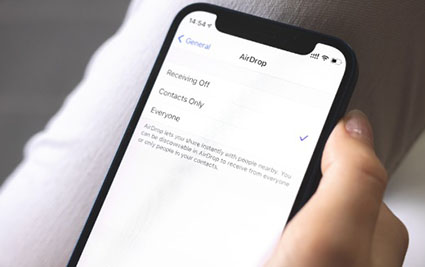by WorldTribune Staff, November 30, 2022
Apple has helped communist China suppress public dissent multiple times.
Usually, it is Apple complying with Chinese Communist Party (CCP) requests to remove apps used by protesters for information and communication.
 Apple also has assisted the CCP in preventing users from remaining private by banning VPNs in the region.
Apple also has assisted the CCP in preventing users from remaining private by banning VPNs in the region.
The brutal regime in Beijing is again getting a big assist from the tech giant.
Just before the largest protests since Tiananmen Square in 1989 broke out, Apple restricted the use of the file-sharing tool AirDrop in China.
On Nov. 9, Apple released a new version of its mobile operating system, iOS 16.1.1, to customers worldwide. Rather than listing new features, as it often does, the company simply said, “This update includes bug fixes and security updates and is recommended for all users.”
Hidden in the update was a change that only applies to iPhones sold in mainland China: AirDrop can only be set to receive messages from everyone for 10 minutes, before switching off. There’s no longer a way to keep the “everyone” setting on permanently on Chinese iPhones. The change, first noticed by Chinese readers of 9to5Mac, doesn’t apply anywhere else.
The tool for iOS had been “used by protesters to communicate freely without the risk of censorship, because the tool uses direct connections between devices, creating a local network that cannot be monitored by government Internet regulators,” Reclaim the Net noted in a Nov. 28 report.
Initially, people could choose to receive AirDrops from everyone nearby. After the update by Apple, users in China “can only receive from everyone nearby for only ten minutes, putting restrictions on how it’s used,” the report said.
Why did Apple rush out the change to AirDrop unannounced, in an unassuming update to iOS in early November, and apply it only to Chinese iPhones?
“One clue may lie in what happened the month prior, when Xi Jinping’s anointment to a third term as China’s leader was met with rare displays of public dissent,” Quartz noted.
In one of the most visible protests on the mainland, a dissident now known as Bridge Man lit a fire on a bridge in Beijing in October just days before the National Party Congress rubberstamped an unprecedented third term in power for Xi, to draw attention to his protest banners. One read, “Go on strike at school and work, remove dictator and national traitor Xi Jinping.” References to the banners were quickly censored across the Chinese Internet, but photos still made their way through private channels.
Vice reported that Bridge Man’s messages were spreading on the Shanghai subway via AirDrop.
“By hobbling the functionality of AirDrop in China, Apple is once again coming to the government’s aid,” Quartz added.
Action . . . . Intelligence . . . . Publish
